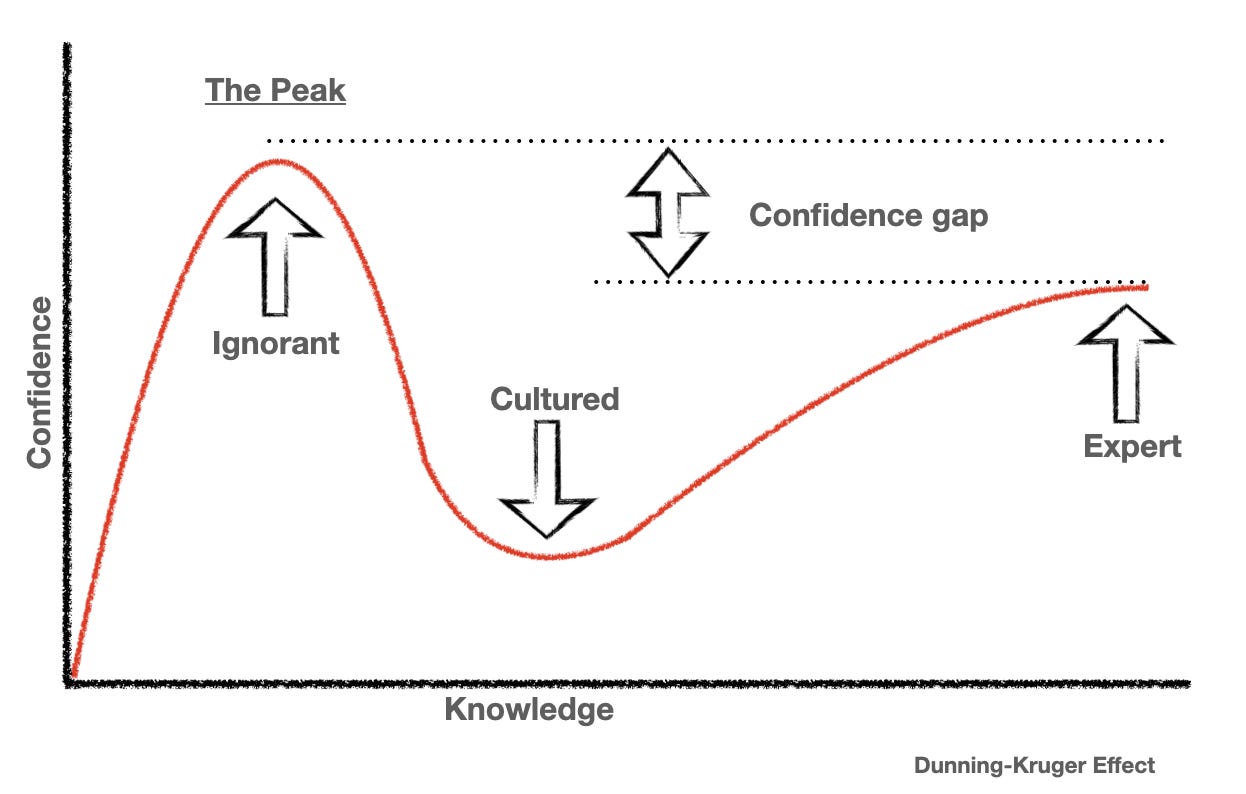Last week I merely flesh wounded the internet when I released How to (Actually) Think Clearly, the first part of my summary of Clear Thinking: Turning Ordinary Moments into Extraordinary Results by Shane Parrish.
Aligning with Clear Thinking, the first part covers why *actually thinking is important. Sounds obvious but we often do things without thinking because of various barriers and default behaviors which impede our progress. Between Lord of the Rings, The Godfather, and every other pop culture at my arsenal, you likely thought I was tapped out. The cupboard was bare.
Well guess again.
Buckle up buckaroos! Sequels are often disappointing but that is not the case this day. Building on what we covered in Part I, this article will focus on building mental strength. What are the skills and traits needed for you to overcome default cognitive biases and put you on the path to success?
How else do you plan on hosting the Catalina wine mixer and driving a Range Rover? Luck? Brute force? Creatine? Good luck with that.
Continue reading if you want to learn how to think good!
But first, make sure to hit the Subscribe button to join 1,000+ other Subscribers that get Serviceable Insights delivered directly to their inbox each week.
If this week’s article does not interest you, please check out some other recent ones:
Part Two: Building Strength
To defeat the enemies of clear thinking you need more than willpower.
You are fighting against biology and decades of existing behavior. You can’t willpower or white knuckle yourself to success. We need equally powerful forces on our side:
Last week we discussed why inertia can hurt, but it can help us as well. Once you start building positive habits, the longer you stick with them, the harder they become to break. Do you brush your teeth everyday? Is this a decision you struggle with? I hope not. You’ve been doing it for so long, it’s no longer a difficult habit to maintain.
Similarly, the longer you eat healthy, the easier it is to continue. A good diet becomes the new default and harder to break. Comedian Tom Segura recounts his experience eating fast food after a long streak of clean eating, suddenly one bite made him feel awful, discouraging him from reverting back to his previous unhealthy eating habits.
There are some tools you can use, such as rituals. Rituals focus the mind on something other than the moment. It creates a pause, enough time for the rational part of your brain to weigh in, before you act.
Beyond rituals there are four types of strengths you need to develop if you want to fight against the enemies of clear thinking:
2.1 Strength #1 — Self-Accountability
Self-Accountability is taking responsibility for your abilities and limitations. Without this you won’t be able to move forward.
Part of being an adult is the ability to hold yourself in check without needing parents, teachers or mentors to do this for you.
This is part of the danger of defining success or failure based on external rewards. Whether that’s trophies, praise or acknowledgement. To be successful you generally need to be willing to commit to things for extended stretches where you won’t get external feedback. They don’t conduct competitions or give out medals each day.
Only you can gauge if you are improving or on the path to success. You need to be able to accept responsibility when you screw up, or else you are feeding into your ego’s desire to shield you from blame.
You are the master of your fate, you are the commander of your own soul.
People who lack self-accountability are running on auto-pilot and will never be in charge.
“Complaining is not a strategy. You have to work with the world as you find it, not as you would have it be.” Jeff Bezos
Parrish gives the example of his inability to deliver the software update on time and despite his myriad of excuses, his colleague didn’t care. If he couldn’t deliver his work on time, they would need to delay an important mission. Parrish defended his ego with all the reasons it wasn’t possible. His colleague didn’t care. It was on Parrish to manage his workload based on the deadline, neither of them could control.
Parrish uses this to contrast the difference between kind and nice people.
Kind people will tell you things a nice person will not. A kind person will discreetly tell you when you have spinach on your teeth at a social event whereas a nice person won’t say anything because it’s uncomfortable. A kind person will share hard truths, even if it might be uncomfortable for them and the receiver of the message. A nice person will avoid giving critical feedback because they are concerned with hurting somebody’s feelings.
Nobody cares as much about your excuses as you do. At the end of the day, it comes down to if the outcome was reached or not. In the NBA, players acknowledge it’s a make or miss league. If you make the shot, you’re the hero. If you miss, nobody cares about how much you practice or how pretty your jumper is.
Self-serving bias will always come up with reasons or excuses why there was nothing you could have done to change the outcome. Whether it’s your fault or not, it’s still your responsibility. Sometimes the circumstances are not in your favor. You might have been dealt a bad hand but all you can do is your best given the circumstances. Poker players know even if they play a hand perfectly, they can still lose.
As a personal trainer, too often I could see clients refuse to accept accountability for their actions. They would show up to all you can eat buffets before a training session and blame external factors on this. Clients that only came because their wife/husband wanted them to be there, were almost never successful. I would only spend a few hours with my clients each week and couldn’t control what they did the second they left. To achieve their goals they would need to take accountability and ownership.
When I started as a fitness professional, I was nice. As I got more experienced, I became kind. I would start to tell them the reason they weren’t seeing results was because they weren’t holding themselves accountable. They could drive to McDonalds right after the gym and guzzle down 3 milkshakes. If they wouldn’t take accountability for their health, they could never be successful.
How you respond can make things better or worse
You can’t control everything but you can control how you react to things. This is a lesson from stoicism. If somebody cuts you off in traffic, you can’t control their car but you can control how you respond to the situation.
Parrish suggests asking yourself “Will this action make the future easier or harder?”.
If you find yourself in a hole, stop digging.
“You’re refusing to accept something that already happened, and that’s crazy.”
Complaining is not a solution. You are not a victim. The most important story is the one you tell yourself. No successful person wants to be around a chronic victim, a passive person. Self-accountability is the strength of realizing that even though you don’t control everything, you control how you respond to everything.
2.2 Strength #2 — Self-Knowledge
Know thyself
If you never utter the phrase “I don’t know” you are aren’t trying to understand. You are probably dismissing things that surprise you. Otherwise you are just trying to rationalize outcomes instead of figuring out how it worked or why that happened.
Accurately being able to assess what you know and don’t know is the key to playing games you can win. Smart people get into trouble when they try to step outside their domain of expertise. Believing because you are successful in one arena, this will automatically translate to success elsewhere is simply hubris. We touched on the Dunning-Kruger effect last time, proving a little knowledge about a topic is a dangerous thing. Understanding how much you know compared to the average participant is essential to figure out your chances at outperforming. Otherwise you are playing a game of chance, with bad odds.
Parrish uses the example of smart real estate investor declining to invest in a business outside of his area of expertise. Too often, our egos will lead us to overstate our chances of winning in activities we aren’t experts in. Charlie Munger shared a similar sentiment, figure out where you have the edge and stick with that.
In some cases, skill doesn’t play a large role in the outcome. The probability difference for winning between a professional and an amateur is relatively small, such as a single hand of poker or Bingo. In these cases, it’s not irrational to think you can win in these kinds of games. However, in other activities where luck plays a relatively small role, such as sprinting or swimming, talent is nearly directly proportional to your chances of winning. If you are going to try your hand at something you aren’t an expert in, you should first evaluate to what extent can a less skilled participant win. (I covered this in greater detail in How To Make Better Predictions).
2.3 Strength #3 — Self-Control
Without the ability to control impulses, you aren’t any different than wild animals in the forest. You can’t eliminate physiological reactions or the conditions that trigger them but you can manage how you respond to them. Often creating space by pausing or slowing down, gives a chance for your rationality to catch up to your default instincts or behavior.
Channeling intensity from short bursts into prolonged motivation is what separates winners from losers. This is why Odysseus can survive the entire Odyssey, whereas Ajax can’t even get past the first battle against Hector (film only reference. They nerfed Ajax like crazy in Troy (2004) but Brian Cox as Agamemnon was phenomenal).
If you can’t control your impulses, you are sabotaging yourself, making it harder to reach your long term objectives. It’s as if you’re in a canoe with one person occasionally paddling in the wrong direction. You might not always make the right choice but at least make sure you aren’t fighting dissent within your own camp (mind).
2.4 Strength #4 — Self-Confidence
Self-confidence is sticking the right balance between your earned competence and your aspiration (belief) of where it can be.
The story of Icarus flying too close to the sun, shared another, often overlooked lesson. If Icarus flew too low, he would have also perished. Many focus on hubris, and overconfidence leading to the fall but many ignore that most dreams are killed not by a lack of competence but people’s lack of confidence to even attempt a daring feat. (More about that in The Power of Confidence).
Dunning-Kruger effect is so powerful because it shows how a little knowledge coupled with excess confidence creates a dangerous cocktail. Being able to discern what you know, versus what you strongly believe is very important, otherwise you fall into dangerous thought patterns you won’t be able to break free from.
The people who fail the most are those more focused on proving they are right instead of being right. Outcome over ego.
2.6 Setting the Standards
You are the average of the 5 people you spend the most time with.
I discussed this in The Most Obvious Secret to Success. Set high standards for yourself, and this should hopefully raise standards for everyone. If you are in a losing environment, eventually you will become a loser. Any good coach, general manager or HR team’s job is to make sure they hire people that will contribute to a winning atmosphere that raises standards, and get rid of people that detract from this.
Champions don’t create standards of excellence, standards of excellence create champions. Parrish shares an anecdote about Henry Kissinger during his time in the State department. Known for exceptionally high standards, when a staffer came with a draft of a memo, Kissinger asked him if it was his best work? The staffer took it back and worked on it more. When he returned to Kissinger, he got the same question again. He returned to polish it further. Only after his third attempt did Kissinger agree to read it.
He didn’t want to waste time looking at unpolished, incomplete drafts. Parrish doesn’t want to either. If you create a culture where presenting incomplete drafts is acceptable, then that’s what you will get.
I do think it’s important to caveat that in some cases speed is better than perfection. Having spent endless hours working on internal documents that never got read or used for anything useful, I eventually opted for sharing drafts very quickly to solicit feedback before investing more time into it. When you are busy and you receive unclear, open ended instructions, it’s likely your efforts will be wasted.
This should not be an excuse to do work badly, when you receive a clear and precise request, it should be done well, the first time. Low standards often come because we don’t care. We lack pride. You shouldn’t accept shipping out low quality products or else you will eventually forget what good and great looks like.
At the same time, you need to exercise judgement when you don’t want to make the perfect the enemy of the good. If you can do something well in 1 hour but it would require 5 hours to make it perfect, you need to decide if the additional investment is worth it. In the case of airplane safety, I would say yes. For an internal memo nobody is going to read anyway, good is likely sufficient.
2.7 Exemplars + Practice
Choose the right exemplars, models to follow. Show me your role model and I’ll show you your future. A better boss will make you better. A strong colleague makes you stronger (check out this article by Giacomo Falcone (no not of the Falcone crime family you Batman nerds) about how your desk mate might be sabotaging your career.
The concept of Mimetic theory from Rene Girard, popularized in Silicon Valley from Peter Thiel and others, believes that desire is driven imitation of our models. We see somebody we aspire to be like, which guides our actions and behaviors to imitate them. If you have high quality A players, managers and mentors around you, there’s a pretty good chance you will mimic their behavior increasing the likelihood of you being an A player in your own right.
Your exemplars or models don’t need to be alive or somebody you know personally. If you believe mimetic theory, it’s preferable to be somebody you don’t know or can possibly compete with. Otherwise this will eventually invite rivalry.
Conclusion
Clear thinking doesn’t just happen, it’s a skill you cultivate. The strengths of accountability, knowledge, control, confidence, and high standards aren’t abstract ideals, they’re muscles you can train every day. Habits turn into defaults, rituals give you pause, and the right role models show you what’s possible. If you commit to practicing these strengths, you stop running on autopilot and start designing your outcomes.
In the end, clear thinking is less about avoiding mistakes and more about consistently stacking small, better choices that compound over time. The future will always test you, but if you’ve built strength, you’ll be ready to meet it head on. No excuses, no shortcuts, and without needing luck or brute force to carry you through.
Thank you for reading. If you liked this article please Subscribe below. I publish articles on a wide range of topics from business, books, current events or anything on my mind.











"rituals, and the right role models" = Practiced Interaction Patterns "PIP" = thermodynamics
From hadrons to humans cultutures, that's what drives evolution and parks harvested energy. Escalating the scale of practice discovers the next frontier. It's all energy driven.
great read.